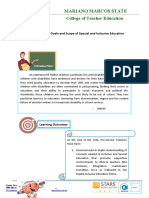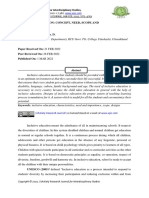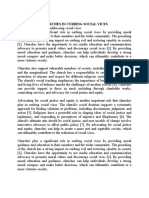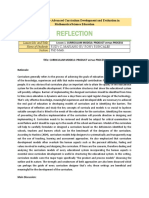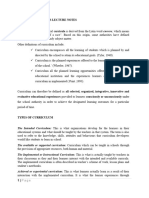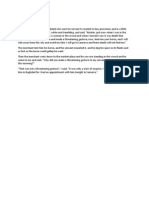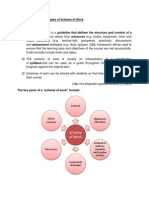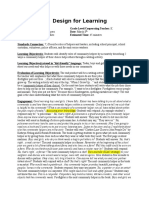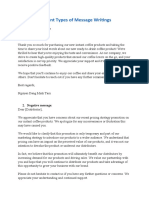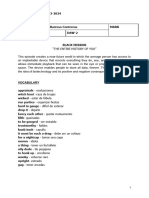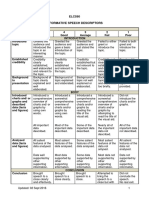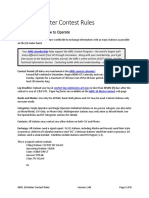Principles For Constructing A Scheme of Work
Principles For Constructing A Scheme of Work
Uploaded by
Joanna ChongCopyright:
Available Formats
Principles For Constructing A Scheme of Work
Principles For Constructing A Scheme of Work
Uploaded by
Joanna ChongOriginal Description:
Original Title
Copyright
Available Formats
Share this document
Did you find this document useful?
Is this content inappropriate?
Copyright:
Available Formats
Principles For Constructing A Scheme of Work
Principles For Constructing A Scheme of Work
Uploaded by
Joanna ChongCopyright:
Available Formats
Principles for constructing a scheme of work
The following guidance may be helpful for teachers who want to review or create their own scheme of work.
Evaluating a scheme of work
When evaluating a scheme of work it may be helpful to consider how far the department's schemes of work and units:
provide long- and medium-term plans that are clearly linked to the programme of study and level descriptions; provide a secure basis from which teachers can plan lessons to meet the needs of all pupils in a class; link teaching activities to the learning they are intended to promote; identify what pupils are expected to learn both within a unit and by the end of the specified period and how pupils' learning may be assessed; provide opportunities to develop literacy mathematics and !"T and where appropriate links with other sub#ects and curriculum areas; give indications of the time needed to teach each unit; encourage good practice in teaching; allow for some flexibility when used; identify the type and use of key resources and make use of a resource range appropriate to the age and ability of the pupils; identify key ideas of the sub#ect so that concepts are built up in an organised systematic and rigorous way; inspire pupils and motivate them to continue studying !"T; set out what is taught and key activities consistent with an agreed timetable allocation for !"T for each year for each teaching group.
$var$www$apps$conversion$tmp$scratch%&$'&&()**+,.doc
Developing a scheme of work
When developing a scheme of work teachers may find it helpful to consider:
the balance between knowledge skills and understanding; how content may best be se-uenced; how to check pupils. progress; links to the wider curriculum; the resources available; the aims and purposes of !"T at key stage + and the sub#ect's contribution to the whole school curriculum; ways in which pupils make progress in !"T.
The -uality of a scheme of work for !"T can be evaluated by the extent to which it enables teaching and learning to:
prepare pupils to participate in a rapidly changing world in which work and other activities are increasingly transformed by access to varied and developing technology;
make available a wide range of !"T tools and resources that are varied and up to date; provide opportunities for pupils to use !"T tools to find explore exchange and present information responsibly creatively and with discrimination; recognise that pupils have their own experiences and knowledge of the world; provide pupils with experiences outside the classroom and with experience of using !"T in other sub#ects;
provide opportunities for pupils to develop initiative and independent learning; enable pupils to work with and communicate with others; enable pupils to en#oy learning !"T and be motivated by it.
/rom http:$$www.standards.dfes.gov.uk$schemes'$secondary%!"T$principles0view1get still on the website 23ep '))*4 but based on 5"6 scheme of work '))).
$var$www$apps$conversion$tmp$scratch%&$'&&()**+,.doc
You might also like
- This Is The Little Book Facebook Gives To Its New EmployeesDocument10 pagesThis Is The Little Book Facebook Gives To Its New EmployeesJaisson K SimonNo ratings yet
- Ombre, Tie-Dye, Splat Hair: Trends or Fads?: I. Perspective Held by The GroupDocument10 pagesOmbre, Tie-Dye, Splat Hair: Trends or Fads?: I. Perspective Held by The Groupcorvette mouNo ratings yet
- Sarah Lesson Plan 2Document2 pagesSarah Lesson Plan 2api-260894328No ratings yet
- Business Benchmark2 Upper Intermediate Students Book Business Vantage Frontmatter PDFDocument7 pagesBusiness Benchmark2 Upper Intermediate Students Book Business Vantage Frontmatter PDFmystery01513% (15)
- Challanges of SBM in New EraDocument24 pagesChallanges of SBM in New EraMadhav Lamichhane100% (1)
- Lecture MethodDocument7 pagesLecture MethodSrd Rch100% (1)
- Seminar Method of LearningDocument14 pagesSeminar Method of LearningRAKESH KUMAR BAROI100% (1)
- Interactive RadioDocument9 pagesInteractive RadioYashwant Singh RathoreNo ratings yet
- Meaning, Nature and Scope of Curriculum, Relationship Between Curriculum and SyllabiDocument9 pagesMeaning, Nature and Scope of Curriculum, Relationship Between Curriculum and SyllabiafeeNo ratings yet
- Rti Academic Intervention Pyramid Tier 1 2 3Document1 pageRti Academic Intervention Pyramid Tier 1 2 3api-297637243No ratings yet
- Lesson 1 Understanding of Concepts, Principles, and Theories of ICT Systems As They Apply To Teaching-LearningDocument47 pagesLesson 1 Understanding of Concepts, Principles, and Theories of ICT Systems As They Apply To Teaching-Learningkevinmanalo90No ratings yet
- Issues and Concerns in The Selection of Subject Content of CurriculumDocument11 pagesIssues and Concerns in The Selection of Subject Content of CurriculumARYA B SNo ratings yet
- Child Centered CurriculumDocument11 pagesChild Centered Curriculumira_sanyalNo ratings yet
- Tanzania Education PolicyDocument13 pagesTanzania Education PolicyHOPE100% (1)
- The Implementation of Learner Centred Approach and Reposition of Education in Public Secondary Schools in Nyamagana District, Mwanza-TanzaniaDocument15 pagesThe Implementation of Learner Centred Approach and Reposition of Education in Public Secondary Schools in Nyamagana District, Mwanza-TanzaniaMonika GuptaNo ratings yet
- Project MethodDocument21 pagesProject MethodLitty Mary JohnNo ratings yet
- Technological AspectsDocument12 pagesTechnological AspectsRosemarie TolentinoNo ratings yet
- Educational Technology DimensionsDocument40 pagesEducational Technology DimensionsJOHN CARLO LORBISNo ratings yet
- Definition of Instructional SupervisionDocument1 pageDefinition of Instructional SupervisionMuriel Comeros100% (1)
- Chapter I. Definition, Goals and Scope of Special and Inclusive EducationDocument12 pagesChapter I. Definition, Goals and Scope of Special and Inclusive EducationcharmaineNo ratings yet
- Teaching AidsDocument3 pagesTeaching Aidsapi-231516879100% (1)
- Learning Activity Task 5Document2 pagesLearning Activity Task 5Meliza OlacoNo ratings yet
- LECTURE 17 - Stakeholders in Curriculum PlanningDocument3 pagesLECTURE 17 - Stakeholders in Curriculum PlanningAeleu Joverz100% (1)
- Special EducationDocument19 pagesSpecial EducationHELEN TAANGNo ratings yet
- Teacher Centered Curriculum, The Role of Teachers & CurriculumDocument7 pagesTeacher Centered Curriculum, The Role of Teachers & CurriculumLawan YusufNo ratings yet
- 18 Strategies of Curriculum ChangeDocument22 pages18 Strategies of Curriculum ChangeTelvin GwengweNo ratings yet
- Social Oriented Curriculum For Social ReconstructionDocument12 pagesSocial Oriented Curriculum For Social Reconstructionbabitha sujanna100% (1)
- Educational Psychology AssignmentDocument4 pagesEducational Psychology AssignmentPriya MalikNo ratings yet
- What Is Technological Pedagogical Content Knowledge?: Instructor: Pedro P. Raymunde JR., LPT, MAEDDocument17 pagesWhat Is Technological Pedagogical Content Knowledge?: Instructor: Pedro P. Raymunde JR., LPT, MAEDJoyce Crystal D. CagadasNo ratings yet
- FS62Document9 pagesFS62Shiela Marie Marcelo75% (4)
- Inclusive Education: Concept, Need, Scope and DesignsDocument8 pagesInclusive Education: Concept, Need, Scope and DesignsAnonymous CwJeBCAXpNo ratings yet
- Concept of Distance LearningDocument5 pagesConcept of Distance LearningAnkit JaiswalNo ratings yet
- The Role of Churches in Curbing Social VicesDocument5 pagesThe Role of Churches in Curbing Social VicesTaiye MofolorunshoNo ratings yet
- Comparism of Objective of Social Studies of Nigeria and GhanaDocument3 pagesComparism of Objective of Social Studies of Nigeria and Ghanakyrian chimaNo ratings yet
- 8603-1 SanaDocument28 pages8603-1 SanaAreeba M.jNo ratings yet
- A Traditional Curriculum Typically Involves A Teacher Conveying Facts To Students. The Curriculum FocusesDocument4 pagesA Traditional Curriculum Typically Involves A Teacher Conveying Facts To Students. The Curriculum FocusesJOHN CARMELO SAULONNo ratings yet
- Four Key Factors in Organizing CurriculumDocument15 pagesFour Key Factors in Organizing CurriculumManeth Alejandro100% (1)
- Unit 1 Lesson 2 Elements of Teaching and Learning 1Document16 pagesUnit 1 Lesson 2 Elements of Teaching and Learning 1ALjun AlonNo ratings yet
- Instructional DesignsDocument4 pagesInstructional DesignsDipti PunjalNo ratings yet
- Process and ProductDocument5 pagesProcess and ProductRudy, Jr MarianoNo ratings yet
- Child AssessDocument21 pagesChild AssessAshley Ibe GuevarraNo ratings yet
- Theories Related To Educational AdministrationDocument14 pagesTheories Related To Educational AdministrationChandni BenaniNo ratings yet
- Field Study 1: University of Caloocan CityDocument7 pagesField Study 1: University of Caloocan CityLovelyn MaristelaNo ratings yet
- Curriculum & PlanningDocument23 pagesCurriculum & PlanningyoyiyyiiyiyNo ratings yet
- Online Distance Education and Communication of LearnersDocument49 pagesOnline Distance Education and Communication of LearnersEricka MarticioNo ratings yet
- Creating Inclusive CultureDocument3 pagesCreating Inclusive CultureJulie Ann Arenasa PiscosNo ratings yet
- Assessment of Ones Teaching PracticeDocument27 pagesAssessment of Ones Teaching PracticeMarvin CayagNo ratings yet
- The Moral Aspect of PersonalityDocument2 pagesThe Moral Aspect of PersonalityAaron Roxas40% (5)
- Concept of Curriculum EvaluationDocument4 pagesConcept of Curriculum EvaluationWaseem SajjadNo ratings yet
- Curriculum Development Module 8Document3 pagesCurriculum Development Module 8Jane Ariane TilloNo ratings yet
- Motivational Techniques: What Is Motivation?Document1 pageMotivational Techniques: What Is Motivation?Ellyssa Erika MabayagNo ratings yet
- Curriculum PPT 2011Document145 pagesCurriculum PPT 2011Gudina Merdasa0% (1)
- The Integrative Strategies of TeachingDocument22 pagesThe Integrative Strategies of TeachingDan Lhery Susano GregoriousNo ratings yet
- Module 1 Lesson 1 PDFDocument5 pagesModule 1 Lesson 1 PDFJoy GeronaNo ratings yet
- Syllabus For TECH6102Document9 pagesSyllabus For TECH6102api-342200066No ratings yet
- Intended VsDocument14 pagesIntended VsRyan Morales67% (3)
- Guidance SyllabusDocument6 pagesGuidance SyllabusJona Addatu100% (1)
- A Critique of Yashpal Committee ReportDocument3 pagesA Critique of Yashpal Committee Reportvencsv100% (1)
- Curriculum Implementation ExplanationDocument6 pagesCurriculum Implementation ExplanationFlorencioNo ratings yet
- EducTech Ref10Document2 pagesEducTech Ref10Dennis Arthur S. LeonorNo ratings yet
- 4 21st Century Skills 1Document26 pages4 21st Century Skills 1Erika Jean Moyo ManzanillaNo ratings yet
- CURRICULUMDocument54 pagesCURRICULUMJoseph MusondaNo ratings yet
- Handbook of Research on TeachingFrom EverandHandbook of Research on TeachingCourtney BellNo ratings yet
- Session 3 Teachers GuideDocument10 pagesSession 3 Teachers GuideJoanna ChongNo ratings yet
- Session 2 Teachers GuideDocument10 pagesSession 2 Teachers GuideJoanna ChongNo ratings yet
- Looking Backward in A TextDocument6 pagesLooking Backward in A TextJoanna ChongNo ratings yet
- Session 4 Teachers GuideDocument8 pagesSession 4 Teachers GuideJoanna Chong100% (1)
- Carry Catch Dance Colour Ask Call Clap Bounc e Dig Draw Eat Cook Close Clean Bake Build Climb Cry Come Dream Cut Brush CombDocument2 pagesCarry Catch Dance Colour Ask Call Clap Bounc e Dig Draw Eat Cook Close Clean Bake Build Climb Cry Come Dream Cut Brush CombJoanna ChongNo ratings yet
- Rules Poster EnglishDocument9 pagesRules Poster EnglishJoanna ChongNo ratings yet
- Name: - Date: - Class: - Listen and Write Down The Correct Number Next To The PictureDocument1 pageName: - Date: - Class: - Listen and Write Down The Correct Number Next To The PictureJoanna ChongNo ratings yet
- Death SpeaksDocument3 pagesDeath SpeaksJoanna ChongNo ratings yet
- Group 4: Marcellyn Audrey Anak Gosen Mohd Ikhwan Haiqal Ismail Joanna Chong Wan TingDocument5 pagesGroup 4: Marcellyn Audrey Anak Gosen Mohd Ikhwan Haiqal Ismail Joanna Chong Wan TingJoanna ChongNo ratings yet
- Components and Principles of Scheme of WorkDocument3 pagesComponents and Principles of Scheme of WorkJoanna ChongNo ratings yet
- WiFi Network SecurityDocument43 pagesWiFi Network SecurityJoanna ChongNo ratings yet
- TeacherpreneurtraitsDocument3 pagesTeacherpreneurtraitsapi-281486234No ratings yet
- PPPU Timetable Semester 1 2017-2018 v1.1 PDFDocument6 pagesPPPU Timetable Semester 1 2017-2018 v1.1 PDFNur ShafineeNo ratings yet
- GSM Vs Cdma Technology: BY Tarush RastogiDocument18 pagesGSM Vs Cdma Technology: BY Tarush RastogitarushrastogiNo ratings yet
- El104 Unit 2 Simplied Reviewer 1Document24 pagesEl104 Unit 2 Simplied Reviewer 1Andrea R. CanoNo ratings yet
- Wireless Communication Chapter 2Document30 pagesWireless Communication Chapter 2Silabat AshagrieNo ratings yet
- Lesson Plan in Grade 11, ICT: I. ObjectiveDocument3 pagesLesson Plan in Grade 11, ICT: I. ObjectiveLG Niegas100% (1)
- Community Helpers LessonDocument4 pagesCommunity Helpers Lessonapi-302422167No ratings yet
- Bballb Hons Sem 1 Minor II - MM - Unit 1Document13 pagesBballb Hons Sem 1 Minor II - MM - Unit 1MargieNo ratings yet
- Different Types of Message Writings - Nguyễn Đăng Minh Tâm - 47K01.2Document3 pagesDifferent Types of Message Writings - Nguyễn Đăng Minh Tâm - 47K01.2Minh TâmNo ratings yet
- Name: Roxanne V Belmonte Course Methods of Teaching ScoreDocument4 pagesName: Roxanne V Belmonte Course Methods of Teaching ScoreMerlinda CarilloNo ratings yet
- Real Estate Social Media StrategyDocument20 pagesReal Estate Social Media StrategyTushar JadhavNo ratings yet
- TEAM Lesson Plan Template: StandardsDocument10 pagesTEAM Lesson Plan Template: Standardslbrinson1No ratings yet
- Varalakshmi Vadapalli US IT Rec - 5+yrsDocument2 pagesVaralakshmi Vadapalli US IT Rec - 5+yrsVara Rao VadapalliNo ratings yet
- Web 2 0 Quiz Assessment Tools A Quick Guide PDFDocument178 pagesWeb 2 0 Quiz Assessment Tools A Quick Guide PDFoscarNo ratings yet
- Solom WorksheetDocument5 pagesSolom Worksheetapi-594410643No ratings yet
- Guide For Taking and Scoring The ECCE Sample Test, Form CDocument3 pagesGuide For Taking and Scoring The ECCE Sample Test, Form CPaul CalderónNo ratings yet
- Saint Louis College: Basic Education Schools High SchoolDocument2 pagesSaint Louis College: Basic Education Schools High SchoolHonorato BugayongNo ratings yet
- Media and Information Literacy: Quarter 2 - Module 7: Producing Multimedia ContentDocument28 pagesMedia and Information Literacy: Quarter 2 - Module 7: Producing Multimedia ContentEugene Amos Espiritu100% (1)
- Family Life and StrifeDocument16 pagesFamily Life and StrifeLourdi-Ann Arig CariagaNo ratings yet
- SQI Solution For Reference - 20110330Document15 pagesSQI Solution For Reference - 20110330យល់ត្រូវ គិតត្រូវ100% (1)
- ParaphrasingDocument4 pagesParaphrasingapi-237128976No ratings yet
- Certificate: K. K. Wagh Polytechnic, NashikDocument6 pagesCertificate: K. K. Wagh Polytechnic, Nashikachutam varpe100% (1)
- ACR Parent OrientationDocument3 pagesACR Parent OrientationMontere Vergenesa Ana MarieNo ratings yet
- Black Mirror - The Entire History of YouDocument7 pagesBlack Mirror - The Entire History of Youbarrosodavid347No ratings yet
- ELC590 Presentation 1 Band DescriptorsDocument4 pagesELC590 Presentation 1 Band DescriptorsDIey ChokiEyNo ratings yet
- World EnglishDocument14 pagesWorld Englishfarah zaheerNo ratings yet
- 10M RulesDocument9 pages10M RulesJCN Taller Restauración y PinturaNo ratings yet



















